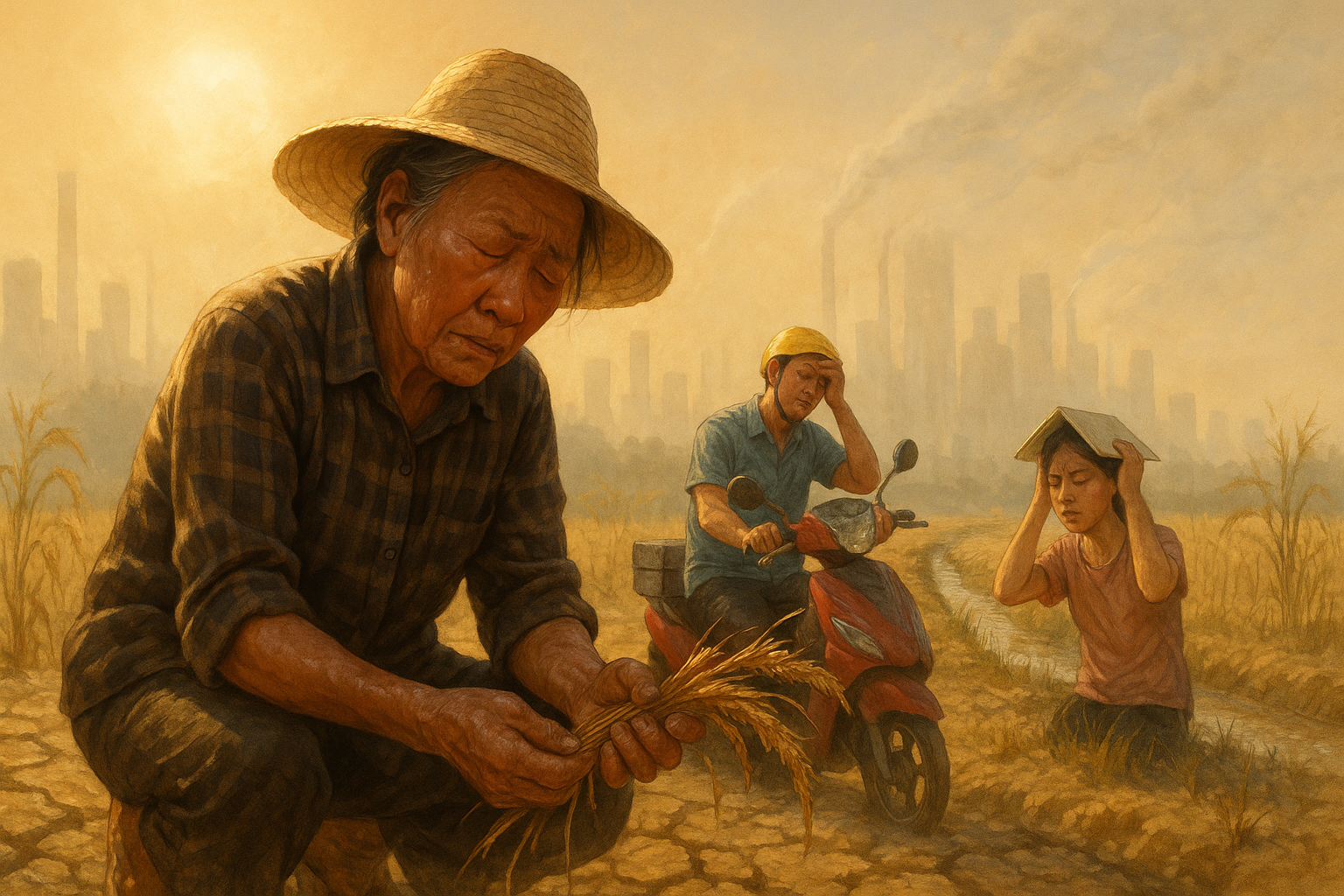Agriculture, food security, water resources, and human health in China under risk due to prolonged heatwaves; Government polices responsible

Urbanisation and the urban heat island (UHI) effect, as well as the growing reliance on fossil fuel-led energy in China, combined with climate change, have caused the country to witness unprecedented heatwaves this year. It has had a severe negative impact on agricultural production, water resources, health, and food security in the country. Moreover, the heatwaves may disrupt economic activity, thus possibly trimming Chinese GDP by nearly one percentage point.
In July 2025, thermal power generation reached 602 billion kilowatt-hours (kWh), which saw a 4.3 percent increase from a year ago. As the heatwaves caused temperatures to soar at extreme levels, the electricity demand surpassed 1.5 billion kilowatts in just one week -- the first time in China’s history. China has witnessed a record number of high-temperature days this July, as 152 national weather observatories noted temperatures over 40 degrees Celsius in mid-July. Prolonged heatwaves led Chinese authorities to issue warnings related to power disruptions as well as health problems.
Incidentally, haphazard urbanisation and industrialisation, combined with disregard for environmental concerns in government policies, are major reasons for the problem. Guan Chenghe, Assistant Professor of Urban Science and Policy at NYU Shanghai, said blamed urban planning for disastrous man-made infrastructure building. “It’s a very critical time. When China starts building new towns, not only in Shanghai, but all over the nation, we should think about how climate change affects people living in new housing.”
Tibet has seen a surge in mining, energy, infrastructure, and urbanization projects, which have caused environmental destruction and disturb ecological balance. Mostly, it is a cold dessert, but parts of Tibet are now experiencing UHI. China’s overreliance on hydropower to meet domestic needs is adding to the problem. “The urbanisation of Tibet by China has caused the temperatures to increase, and this, coupled with global warming has melted 50 percent of the glaciers in Tibet in the last fifty years,” said Sikyong Lobsang Sangay, the then political head of the Central Tibetan Administration.
The China Meteorological Administration has urged people to avoid prolonged outdoor exposure as the cases of heatstroke and exhaustion surged. A 67-year-old woman from Zhejiang collapsed, suffered a brain haemorrhage, and later died due to long exposure to the hot sun. “For healthy individuals, the focus should be on sun protection and heatstroke prevention. In this kind of summer heat, staying indoors with air conditioning is the most comfortable choice,” said Zhuangshi Lihe, a medical influencer.
One student at Qingdao University in Shandong suffered from heatstroke, forcing the administration to allow students to sleep in an air-conditioned library and upgrade its student accommodation later. During the same time, a staff member of the university died. A farmer named Zhou Yaping from Shanxi province expressed worry over the decline in agricultural output due to the heatwave. "I've been growing wheat for over 20 years, and I've never seen a drought this bad," she said.
Those working in the field were more susceptible to extreme heat, said Lu Hui, a doctor from Zhaoqing, who sent many labourers, delivery agents to emergency treatment due to heat exhaustion. “Heat stroke and heat cramps are indicative of severe heat exhaustion. Without timely intervention, progression from the initial signs of heat exhaustion to severe illness can be rapid,” Hui said.
A Chinese government tender database showed only three infrastructure projects in Beijing have explicit mention of ‘ecological resilience’, even though many commissioned projects lacked priority to climate adaptation. Zhou Jinfeng, Secretary-General of the China Biodiversity Conservation and Green Development Foundation, said "The current understanding of the climate crisis and its future challenges is insufficient, which naturally leads to insufficient deployment and planning."
It is not just health problems and mortality, but the heatwaves also caused economic productivity to decline in recent years. The extreme temperature caused the heatwave-related deaths to increase by 309 percent in 2023, according to a report by Chinese researchers in the Lancet Countdown on health and climate change. “Heatwave-related deaths in China increased by 1·9 times from 2019–23 compared with 1986–2005. By the 2060s, annual heatwave-related mortality is expected to reach 29,000 to 38,000 in China, an increase of 183–275 percent from historical levels, with most provinces seeing more than double the fatalities,” reads the report.
Zhao Mengzhen, one of the authors of the report, highlighted how prolonged heatwaves caused severe physiological strain on workers and reduced labour productivity. “High temperatures can affect workers’ reaction speed and coordination, thereby reducing productivity or even increasing the chance of work-related injuries. Regions which are cool now may experience heatwaves in the future, while currently hot regions may become unbearable,” Zhao said.
The warm and dry weather due to extreme heatwaves is affecting the important fertile region along the Yangtze River, thus leading to lower farm output and economic losses. "Heatwaves in China bring drought risks, and this could be a concern in southwestern China this year," said Chim Lee, a senior analyst at the Economist Intelligence Unit. Zhai Jianqing, a meteorological disaster specialist at the National Climate Centre, said the heatwaves, along with low rainfall, led to the development of drought in the northwest regions of the Yangtze River and southwestern provinces, including Sichuan.
Heatwaves have also caused agricultural production to decline, even as the country struggles to become self-sufficient in food. Zhang, a farmer from Henan province, said his wheat yield was 40 percent lower due to the heatwave. "After covering the costs of seeds, harvesting, and ploughing, we just break even with little to no profit," he said. This year, China expects 5 percent less wheat production, making Chinese food security vulnerable to geopolitical risks, especially when the trade war looms large. China has now come up with a disaster prevention and mitigation plan after severe drought conditions affected wheat output, especially in Henan province, which accounts for one-third of wheat production in the country.




![From Kathmandu to the World: How Excel Students Are Winning Big [Admission Open]](https://www.nepalaaja.com/img/70194/medium/excel-college-info-eng-nep-2342.jpg)
